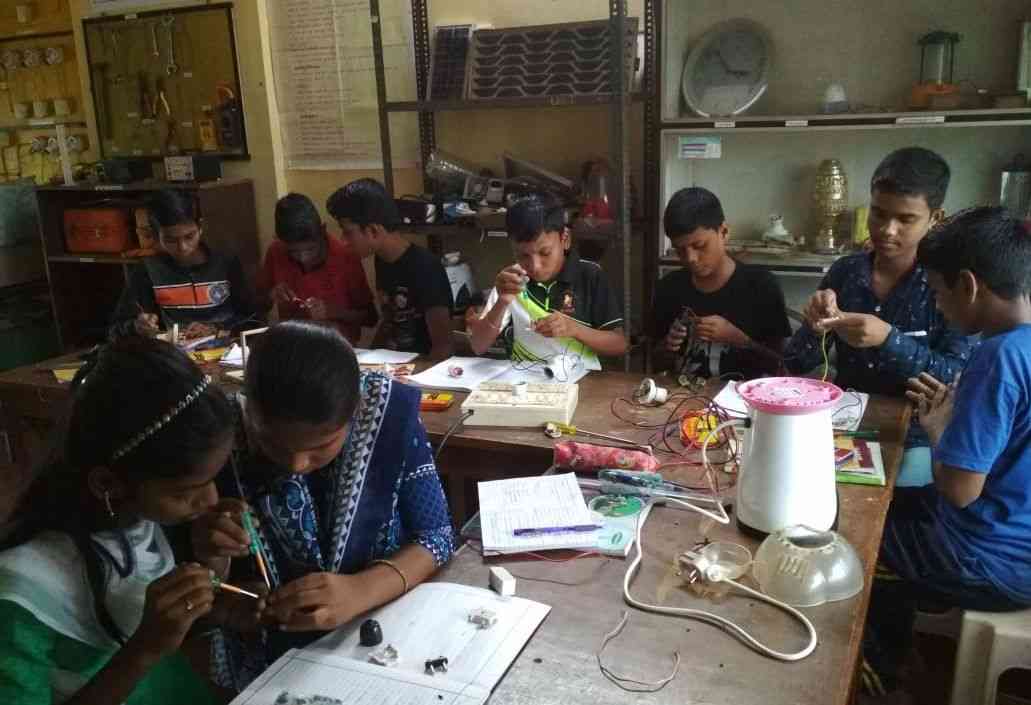Introduction to Basic Technology- IBT
Loksadhana Public Charitable Trust has introduced the course Introduction to Basic Technology (IBT).
The objective of IBT is integrating Socially Useful Productive work with the school curriculum.
The program is recognised under National Skills Qualification Framework (NSQF) and Multi-Skill Foundational Course (MSFC)

What is IBT?
Course is conducted 10 hours in a week.
Who can implement IBT ?
- Any school from class VI – X std can implement IBT program
- IBT program spans for a period of 2-3 years.
- It is designed especially for students from Class VIII to Class X to expose them to range of skills needed for technical, vocational and entrepreneurial careers.
- Govt of Maharashtra has approved it as a Pre-vocational subject V1 for class VIII – X std since 1987
How has Loksadhana Public Charitable Trust implemented IBT?
- The students take this program one day per week that is 4-5 school hours per week during the school.
- The School Provides for Land, two classrooms of 800 square feet each and en electrical connection.
- Tools and equipments of about Rs.1,50,000 have been made available in the school.
- Instead of having traditional school teachers teach the subject, micro-entrepreneurs from the local community are hired and trained as instructors, introducing students to the actual day-to-day life of a particular vocation.
- Recurring expense for instructor’s honorarium and consumables is arranged through donations and small contributions from the students (Rs.20-Rs.100).
- A science, maths or other subject teacher is involved to link work activity to the concepts in the school curriculum.
What is the objective of introducing IBT?
- Creating harmonious blend of education and rural development.
- Achieving the natural intellectual development of students with the help of “learning through action oriented tasks” method.
- Enlarging the world of experiences of students.
- Preventing the youth drain from rural areas to cities.
- Training the students for useful multi-skill jobs.
Let us understand all the objectives in detail
- Capability to think and act: General academic education is intended to give the capability to think. The work experience by practicing the action oriented skills not only helps in the thinking process but also provides the ability to act on one’s thoughts.
- Plan future Career: Experience is a basic component of learning. Prevocational program is intended to give an understanding to the students about their likes, dislikes and passion. Hence they are better equipped to choose their career in future.
- Caters to out of school youth: It also caters to out of school youth. BY giving access to the training facilities and helping them to assist in community services the students feel more confident and it also helps the needy people in the society. This becomes a step in their starting their own enterprise. This function is aided by the network of resource groups planned for the prevocational schools.
- Delivery Channel for New Technology: The school’s technical wing is in a remote area. This acts as a channel of innovation. The students at Lokmanya Tilak Prathmik Vidya Mandir have developed LED lights, drones etc. They have prepared projects to harness kinetic energy and convert it to electrical energy using stationary bicycle (exercise cycle). This cycle produces enough energy which can be used to run a water pump motor. This cycle has been produced by using scrap.
- A New Work Culture: The students get introduced to new work culture. The subject inculcates divinity of labour within the students. The students indulge in all the activities including farming, construction, setting up electrical devices etc. This also helps the poor villagers to get their work done at a low cost or no cost. For example the students have helped a widow in farming right from plowing, planting, cultivating, fertilising, and harvesting crops. This helped her to successfully make her living even after sudden death of her husband. This is how IBT introduces students to a new work culture and also helps the community in the rural areas. This is also called as community farming.
Benefits of IBT in future educational endeavours:
- BT not only introduces various technologies but also gives practical realisation of those technologies to students.
- IBT encourages practical based training approach and consequently achieves the intellectual development of students.
- The innovative mind of student is nurtured by IBT and IBT also encourages them to think out of the way to achieve excellence.
- Students gain confidence by actually using the technologies they learn. They inculcate the habit of innovating.
- This course makes them aware of the career choices they have according to their liking about a particular module.
- The most important benefit of IBT is it assures reserved seats for some courses in future learning. This helps them get through the admission process easily.
Skill sets are divided into four training sub-modules in the curriculum:
Non-Living
- Basic engineering
- Energy and the environment
Living
- Agriculture and Animal husbandry
- Food Processing and Health science
Narendra
Teacher
Mr. Narendra is an ex-student of Lokmanya Tilak Vidyamandir, Chikhalgaon. For last 10 years he has been teaching the subjects- Electrical and Environment Sciences in the technical department of Loksadhana Tilak Vidyamandir, Chikhalgaon. He has been heading the electrical division of Loksadhana Public Charitable Trust. He has been working on various innovations in the field of LED lights and unconventional sources of electricity along with the students. The school has started the technical courses to help the students start their own enterprises and encourage entrepreneurship.
Kisan Pande
Project Co-ordinator
Kisan Pande is an ex-student of Loksadhana. Since 2005, he has been working as a Project Co-ordinator with the Department of Vishwakarma Padmashree Annasaheb Behere Gramin Technology Centre. The Centre works for helping the students to understand the needs of the villagers and start occupation in the field of what interests them taking into consideration the market demand. Mr. Kisan has been a Master Trainer for IBT in various states.
Principles of IBT Course:
- Learning through action oriented method.
- Learning multi-skills.
- School as production unit.
- Developing entrepreneurship of the trainers.
- Providing community services
Special Features of IBT course:
- Schools can apply for this program for 8th to 10th standards as an option to subject “Work Experience”. It is recognized by SSC board as Vocational I (VI) course.
- Can be selected as curriculum subject for 8th to 10th standard.
- Useful in cities as well as villages.
- One day in a week will be dedicated to actually doing the tasks that students are learning.
- Students gain practical experience by providing Community Services.
- Society is getting benefited by services provided by the IBT students.
- Intended to create innovative students with the help of action oriented education.


What is taught in IBT Program?
Agriculture and Animal Husbandry
Drip irrigation, Sprinkler, Vermi composting, Vemi wash, Humidity chamber, AQUA Portal, Nursery technique, Azolla culture, Weather SMS, Seedling Tray, Vaccination Poultry, Age estimation, Rice cultivation, Crop using (SRI) Mulching, Silage Feed concentrate for animals , Pest control , Soil testing
Energy and Environment
Solar cooker, LED lighting ,Biogas, Soak pit, Watershed, Smokeless stove(Check dam construction),Earthing, Inverter Computer applications, Plain table survey GPS
Food Processing and Health Science
Solar drying, Food preservation, Drying of vegetables Medicinal plant cultivation, Mosquito control (Gappi Fish breeding)
Making phenyl, Liquid soap, Water testing Healthy diet, Soya milk, Blood testing
Engineering
Ferro cement, Bamboo treatment,
Different Agriculture tools Ventilation – Low cost housing, Toilets, Pedal power, Fabrication, Plumbing, Construction


